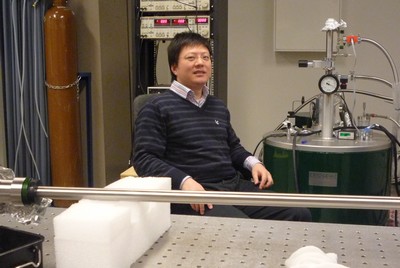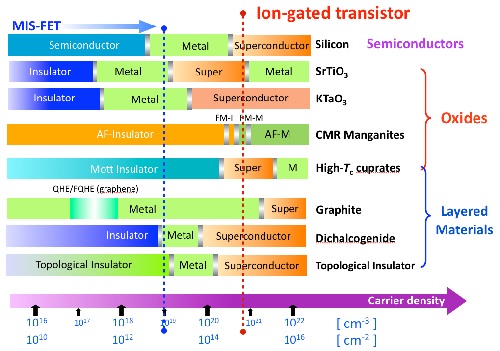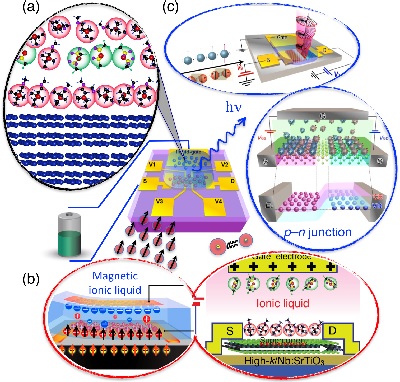Liquid transistors to control quantum states
The quantum world is hard to control. At present no switches are available for superconducting circuits or other quantum states. At the University of Tokyo, Jianting (Justin) Ye was part of a team that invented a transistor that might solve the problem. Now at the University of Groningen, Ye wants to turn this proof of concept into real devices.

Superconductors, entangled photons, ferromagnetism… These are all quantum states with great potential to enrich the functionality of electronic devices. Just imagine: superconducting circuitry with no energy loss or heat production, or being able to send information through entangled photons. But such devices require transistors to control these quantum states.
Justin Ye, associate professor at the Zernike Institute for Advanced Materials , thinks he can use ion-gated ‘liquid’ transistors to build such devices. The European Research Council recently awarded him a Consolidator Grant of EUR 2 million to do just that. ‘If you use ionic liquids, you can reach the capacitance needed to induce changes in superconductors’, Ye explains. ‘And it also allows us to mix different properties. For example, if we use a magnetic ionic liquid, we can control ferromagnetism and superconductivity.’
The key here is large capacitance. Field effect transistors (FET) can use an electric field to control the conductivity in a semiconductor material, but if you want to switch quantum states, you need a very high charge density. ‘It is very difficult to attain this in a solid state FET’, Ye explains.

A normal FET uses a solid ‘gate insulator’ to switch between ON and OFF states. This insulator, at a few dozen nanometers, is relatively thick to prevent leakage of charge. ‘This limits the charge density, and once fabricated these solid state gates have a fixed device structure.’
Ye therefore wants to make a device that uses an ionic liquid as its gate insulator. He worked on this concept as a junior scientist at the University of Tokyo. ‘Ionic liquids comprise a large family of materials that look like a liquid or gel. Once biased by voltage, the effective capacitance can be very thin, around one nanometer’, Ye explains. ‘Consequently, the capacity is about 100 times higher than a solid gate, which makes it high enough to change quantum states. Also, the ions can move in the liquid, so it is possible to reconfigure the device freely.’

Furthermore, the ions in the liquid can be diverse, so you can choose different ion species and special ions associated with magnetic moment. A year ago, Ye co-authored a Science paper describing how ion liquids could be used to control the polarity of light emitted by a diode. ‘The normal way to get polarized light is to use a filter that allows light with the intended polarization to pass through. What we did was to electrically control the emitted light for the required polarization.’
All these previous results represent initial steps to prove the concepts. ‘We are still in the exploration stage’, says Ye. ‘But my intuition tells me that these techniques might be the key that will enable us to enter the realm of controlling quantum states, which means exciting choices and future devices that combine different quantum states like superconductivity, entanglement of photons or magnetism.’
The ERC Consolidator grant will allow him to explore his ideas and translate them into working devices. ‘However, the road to a real product will be long’, he notes. At the moment, about two dozen groups are working on ion liquid switches, nearly all of them in Japan or the US. There is a bit of a conceptual barrier here, ‘Naturally, most device physicists are not particularly interested in chemistry. Most of their methodologies come from solid state physics. As one of them, I must learn to think in a different way to work with ion liquids.’

The solid state FET has been dominant for decades. ‘But when the very first prototypes of FETs were designed, more than half a century ago, the devices were in fact based on moving ions dissolved in a polymer.’
Ye moved to Groningen in 2013 from Tokyo, where he was part of the team that invented the new ion-gated transistor. Why did he make this move? ‘I wanted to take the next step in my scientific career’, he smiles. He got several offers and chose Groningen: ‘As a scientist, my career will never be a local one. It was a big move from Asia to Europe, but I was attracted by the possibility to run my own group in the Zernike Institute, a well-known institute with good facilities.’
He has spent the past eighteen months building his lab and assembling his own group. His group of seven, which includes two Master’s students, is set to double thanks to the ERC grant. New results are beginning to flow from this young lab. ‘We are about to submit our first paper made in the Netherlands.’ So watch this space!
| Last modified: | 10 June 2015 11.19 a.m. |
More news
-
16 April 2024
UG signs Barcelona Declaration on Open Research Information
In a significant stride toward advancing responsible research assessment and open science, the University of Groningen has officially signed the Barcelona Declaration on Open Research Information.
-
02 April 2024
Flying on wood dust
Every two weeks, UG Makers puts the spotlight on a researcher who has created something tangible, ranging from homemade measuring equipment for academic research to small or larger products that can change our daily lives. That is how UG...
-
18 March 2024
VentureLab North helps researchers to develop succesful startups
It has happened to many researchers. While working, you suddenly ask yourself: would this not be incredibly useful for people outside of my own research discipline? There are many ways to share the results of your research. For example, think of a...

